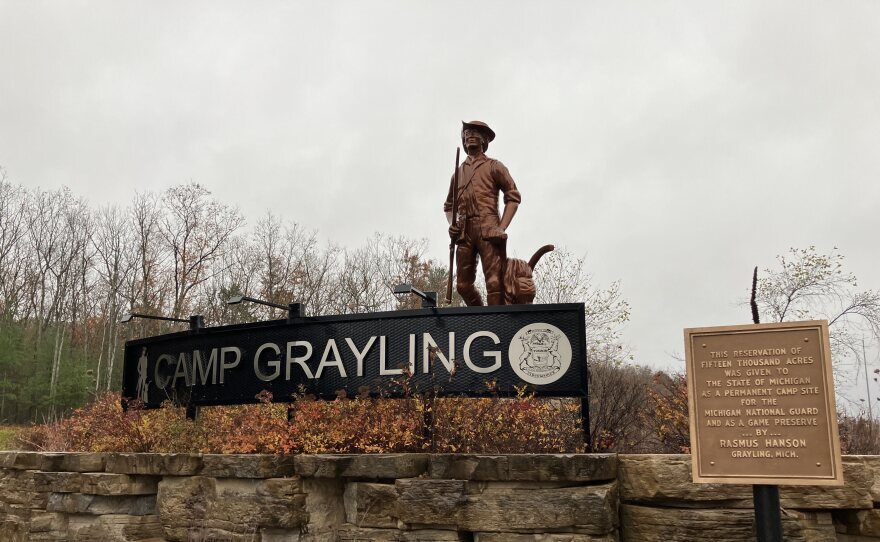Grayling residents are calling on the Department of Defense (DoD) to help bring clean drinking water to the community and implement policies, they say would advance PFAS cleanup around Camp Grayling.
WCMU news director Rick Brewer spoke with environmental reporter Teresa Homsi about a recent letter the Lake Margrethe Property Owners Association (LMPOA) sent to top defense officials.
This transcript has been lightly edited for clarity and length.
Rick Brewer: Teresa, you've been hearing a lot about the Department of Defense lately when it comes to PFAS contamination. Just give us a little background on this issue, please.
Teresa Homsi: Last summer, the DoD implemented a policy that requires around 700 PFAS-contaminated military sites to look for areas where they could implement interim cleanup systems.
These actions basically prevent contaminants from leaving military sites while the DoD is able to step back and figure out what long-term cleanup solutions should be.
Recently, the DoD released a list that includes the first round of communities that are getting some of these cleanup actions, which includes Oscoda and Grayling.
And while PFAS contamination has been publicly known for several years in these communities, we've only really seen more federal action and recognition in the last couple of years.

RB: This letter includes a lot of demands — it involves a request for funding to support an infrastructure project in Grayling. Tell us a little bit more about that, please.
TH: Grayling Charter Township is in the middle of designing a water main that would bring clean drinking water from the Kirtland Community College, north to neighborhoods around Grayling that have been impacted by contamination.
With the help of a $25.6 million state grant, the township is aiming to get water flowing in 2025 to two neighborhoods: Sherwood Forest and Clough Estates, which are part of the "initial service district."
The township is building what they already have funding for, but they know there are other areas around Lake Margrethe that could benefit from this water main.
That's where this letter comes in: residents are asking the DoD to give additional funding and cover the remaining costs to make sure the entire water main is built.
Kerrigan Clough, a retired EPA administrator and committee member on the Property Owners Association, said he's "cautiously optimistic" the DoD will help fund the project.
"They caused the contamination, and so it is their responsibility," he said. "And it's part of the Department of Defense's mission to clean up problems that they create."
National Guard representatives said they're still working to, "define the support requirements and emplacement mechanisms necessary for the installation of the Grayling Township municipal water upgrades."
"We will make every effort to prepare for the water main upgrade to alleviate delays once federal funding is released," wrote Jonathan Edgerly, an environmental manager with the Michigan Army National Guard.
Edgerly said there is no timeline for when funding would be granted or made available.
Township supervisor, Lacey Stephan III, told WCMU in December the township and state aren't holding out for DoD funding to build the main.
"If they pitch in, great — if they don't, I'm doing everything I can to make this happen," Stephan said. "I'm not waiting anymore, and neither is (the Michigan Department of Environment, Great Lakes and Energy)."

RB: Now, there's more to this letter because it also requests two DoD policy changes that residents say would expedite this cleanup process, right?
TH: Yes, the letter also addresses some issues that are present in Oscoda and other contaminated military sites across the U.S.
Testing is a huge source of discussion, and it's a really important part of the remedial investigation. As part of the federal cleanup process, the DoD needs to test a bunch of drinking water, needs to find PFAS sources, etc.
DoD officials and contractors collect data to get a lay of the land when it comes to how PFAS are moving, that eventually is going to lead them to a cleanup solution. But currently, the DoD does not accept well water testing results from the state of Michigan.
Clough said the state has collected significantly more samples around Camp Grayling than the National Guard. He estimates that accepting state data could shave a couple of years off the cleanup process.
"It makes no sense not to use (state) data, and it slows things down and costs us taxpayers a lot more money to replicate data that has been quality assured by the state," Clough said.
The other policy change concerns proposed federal drinking water standards.
RB: Teresa, quickly remind us, what are those standards?
TH: The EPA proposed some standards on a few PFAS chemicals last spring — that basically sets what levels of PFAS are allowed in your well or municipal water.
Michigan already has standards for several PFAS compounds, but the federal ones are going to be a lot stricter than what the DoD is currently following in its remediation.
So, as the DoD plans and implements cleanup systems in places like Oscoda and Grayling, Clough said they're not being designed with those lower standards in mind.
He said it would save taxpayers a lot of money, and it would save a lot of time to design those systems from the get-go that are going to consider lower, stricter federal standards — as opposed to doubling back and then needing to update all these systems.
"Seven years ago, PFAS was first detected in wells and in the lake," Clough said. "There's been a lot of poking around, slow walking by the military on this one when it could have gone a lot quicker."
The EPA is behind schedule on the drinking water standards and their PFAS promises, so I'm not sure when they'll actually be implemented, but it could be any day now.
Read the full letter below:






